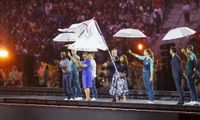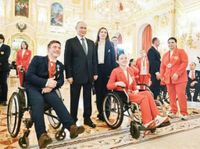In a decision that has sent ripples through the global sporting community, the International Paralympic Committee (IPC) voted on Saturday, September 27, 2025, to lift the partial suspensions of Russia and Belarus—countries that had been sidelined from Paralympic competition since Russia’s invasion of Ukraine in 2022. The move, made at the IPC’s general assembly in Seoul, South Korea, restores the full rights and privileges of IPC membership to both nations, opening the door for their athletes to potentially compete under their own flags at the upcoming Winter Paralympics in Milano Cortina, scheduled for March 6-15, 2026.
Saturday’s vote was decisive, if contentious. The IPC membership rejected a full suspension for Russia by a margin of 111-55 (with 11 abstentions) and turned down a partial suspension by 91-77 (with eight abstentions). Belarus received similar treatment: 119-48 against full suspension (nine abstentions) and 103-63 against partial suspension (10 abstentions). These numbers underscore the deep divisions and heated debate within the international sporting community over how best to balance the ideals of inclusivity and the realities of ongoing geopolitical conflict.
“This decision means NPC Belarus and NPC Russia now regain their full rights and privileges of IPC membership, in accordance with the IPC Constitution,” the IPC confirmed in a statement. “The IPC will work with the two members involved to put practical arrangements in place for this as soon as reasonably possible.”
The decision marks a dramatic shift from the stance taken in the wake of Russia’s full-scale invasion of Ukraine. In 2022, both Russia and Belarus were banned from international sporting events, including the Paralympics. While some Russian and Belarusian athletes were able to compete at the 2024 Summer Paralympics in Paris, they did so under strict neutrality conditions, without national flags or anthems, following a partial suspension imposed in 2023. The latest move by the IPC essentially reverses that course, at least at the organizational level.
Reactions to the decision have been swift and polarized. The Russian Paralympic Committee wasted no time in welcoming what it called a “fair decision.” In a statement posted on its website, the committee declared, “This is an important contribution to the development of the international Paralympic movement and an example that the rights of athletes must be protected without discrimination on the basis of nationality and political affiliation.” The sentiment was echoed by Russian athletes currently competing as neutrals at the World Para Athletics Championships in New Delhi, who now see a path to returning under their own banner.
Ukraine, however, responded with outrage and disappointment. Sports Minister Matvii Bidnyi did not mince words, describing the decision as a betrayal of conscience and Olympic values. “We call on our European partners, who will host the upcoming Winter Paralympic Games, not to allow the flag of the aggressor state to be raised over the free and democratic space while the war of aggression continues,” Bidnyi stated on X (formerly Twitter). He emphasized the importance of the host country and organizing committee’s positions and revealed that Ukraine’s decision on whether to participate in the 2026 Games would be made collectively at a later stage, guided solely by the interests of a “free and united Ukraine.”
The path forward for Russian and Belarusian athletes remains anything but straightforward. While the IPC has reinstated their national committees, the international federations governing the six sports on the Milano Cortina Paralympic program—para Alpine skiing, para cross-country skiing, para snowboarding, para biathlon, para ice hockey, and wheelchair curling—have so far maintained their own bans on athletes from the two countries. This creates a complex web of eligibility requirements and ongoing uncertainty for athletes hoping to compete in Italy next March. To participate, each athlete will need an active license for the 2025/26 season from their respective international federations, a hurdle that may prove significant if the bans are not lifted in time.
Marie-Amelie Le Fur, president of the French Paralympic Committee, voiced concerns about the tight timeline and the ongoing selection processes. “It may seem short (notice) indeed, since many selection paths are particularly advanced,” Le Fur told AFP. “To date, not all quotas have been filled by the national Paralympic committees. When the quotas are re-established, under the guise of universality, this could also open up quotas for the Russian and Belarusian committees, which have regained their rights. We must wait for the positions of the international federations and how the final selection process unfolds.”
The history of Russian participation in the Paralympic Games has been turbulent over the past decade. The Russian flag has not been seen at a Paralympic Games since the Sochi edition in 2014, following a widespread doping scandal that led to the country’s suspension in 2016. Russian athletes subsequently competed under neutral banners in Pyeongchang in 2018 and Tokyo in 2021. The IPC excluded both Russian and Belarusian committees from the 2022 Beijing Winter Olympics, and only a handful of athletes from these countries appeared at the Paris 2024 Games as neutrals.
The IPC’s latest decision comes just days after the International Olympic Committee (IOC) confirmed a similar approach for the 2026 Winter Olympics in Milan-Cortina. The IOC will allow Russian and Belarusian athletes to compete as Individual Neutral Athletes (AIN), provided they meet strict neutrality conditions. IOC president Kirsty Coventry summarized the approach succinctly: “The exact same approach that was done in Paris,” referencing the 2024 Olympics where Russian athletes could only take part under a neutral flag and in individual events. The size of the Russian and Belarusian delegations for 2026 will now depend on the qualification processes managed by the respective international federations, some of which continue to bar athletes from both countries.
As the dust settles from the IPC’s landmark vote, the sporting world finds itself at a crossroads. The decision is being hailed by some as a victory for the rights of athletes and the principle of non-discrimination, while others see it as a dangerous concession that undermines the values of the Paralympic movement and the broader Olympic family. The coming months will reveal whether the international federations follow the IPC’s lead or stick to their own bans, and whether Russian and Belarusian athletes will ultimately take to the field in Milano Cortina under their own colors—or not at all.
For now, the IPC has set the stage for a potentially dramatic and controversial build-up to the 2026 Winter Paralympic Games, with the world watching closely to see how the next chapter in this ongoing saga unfolds.



